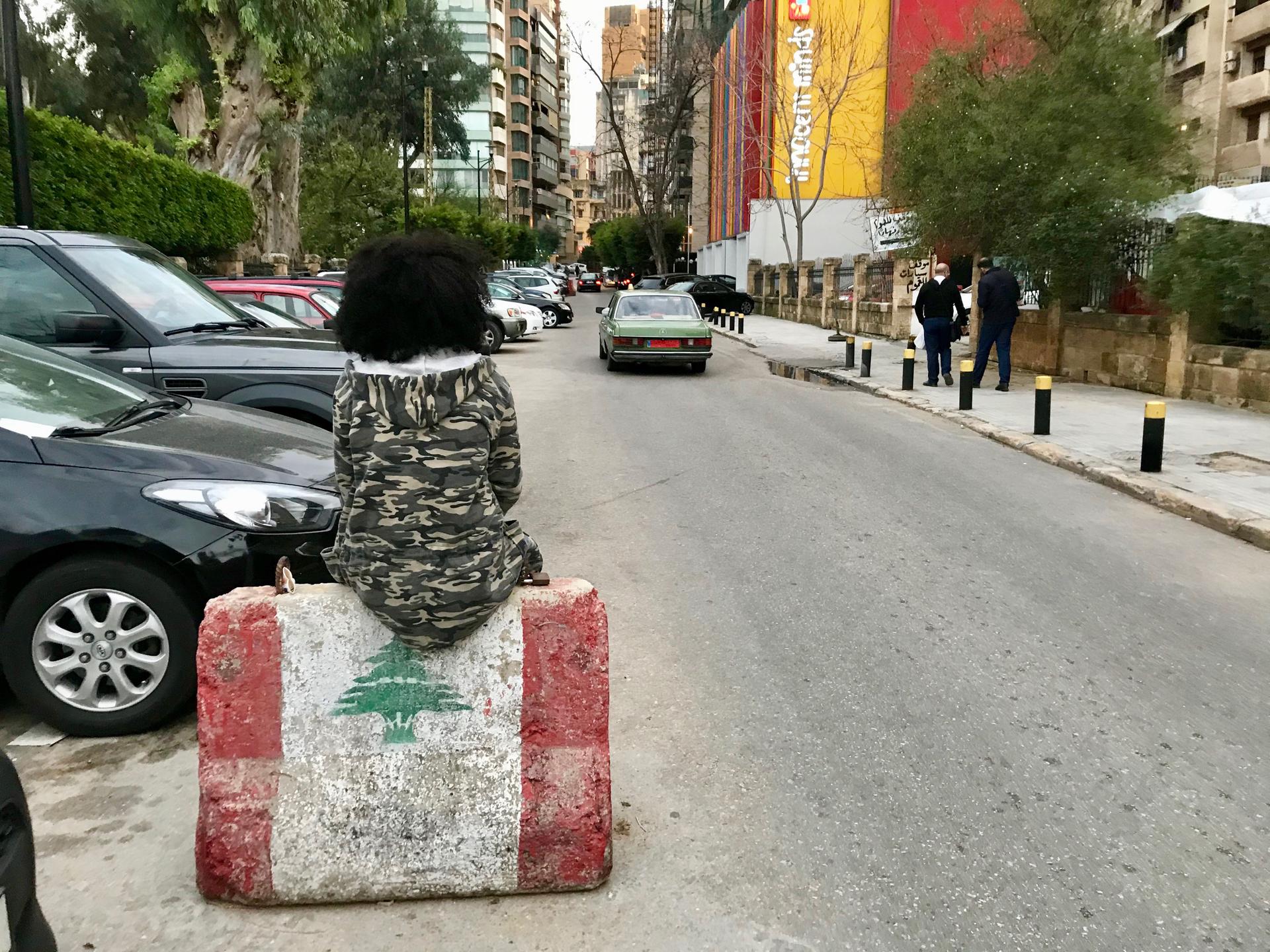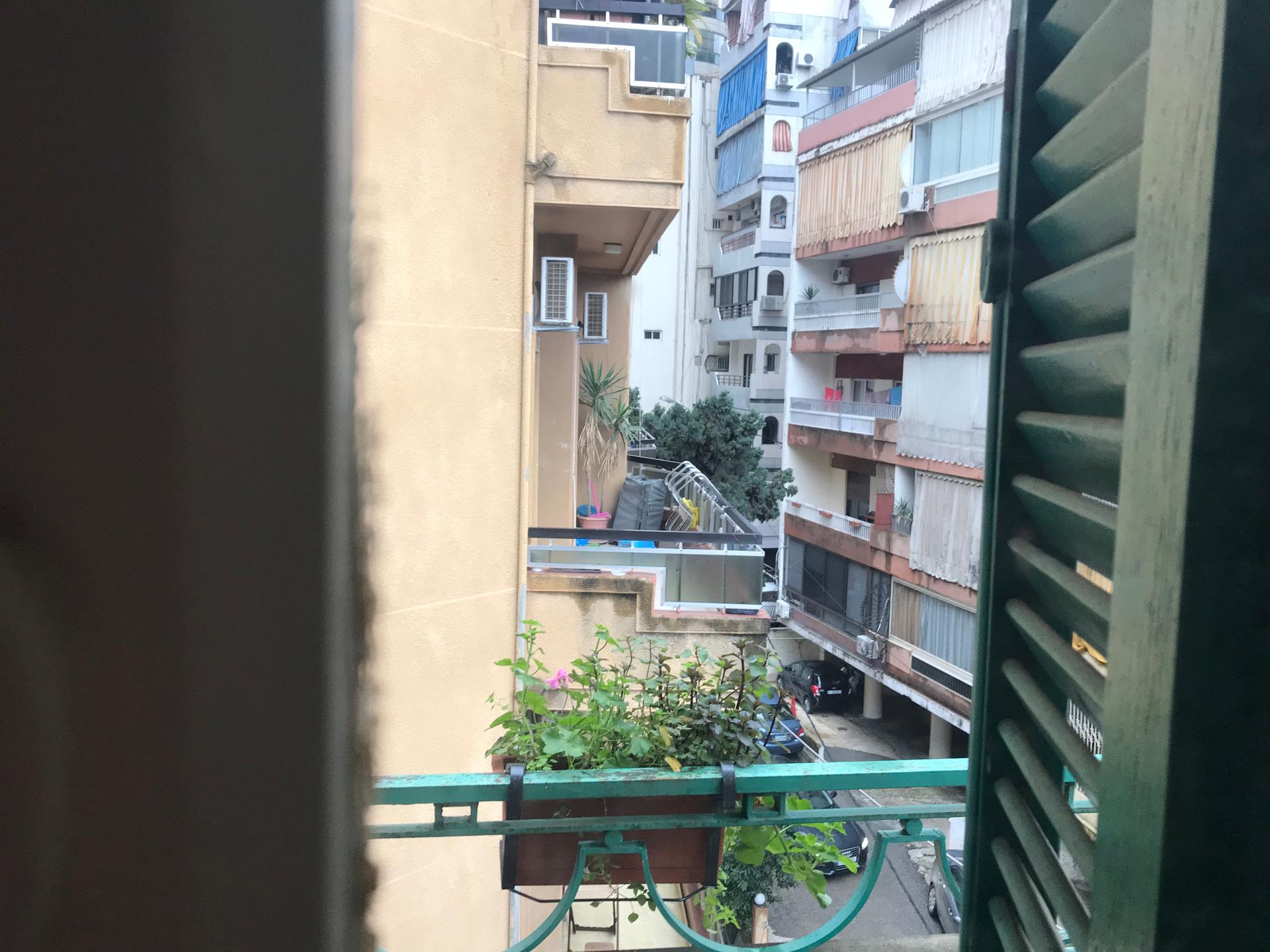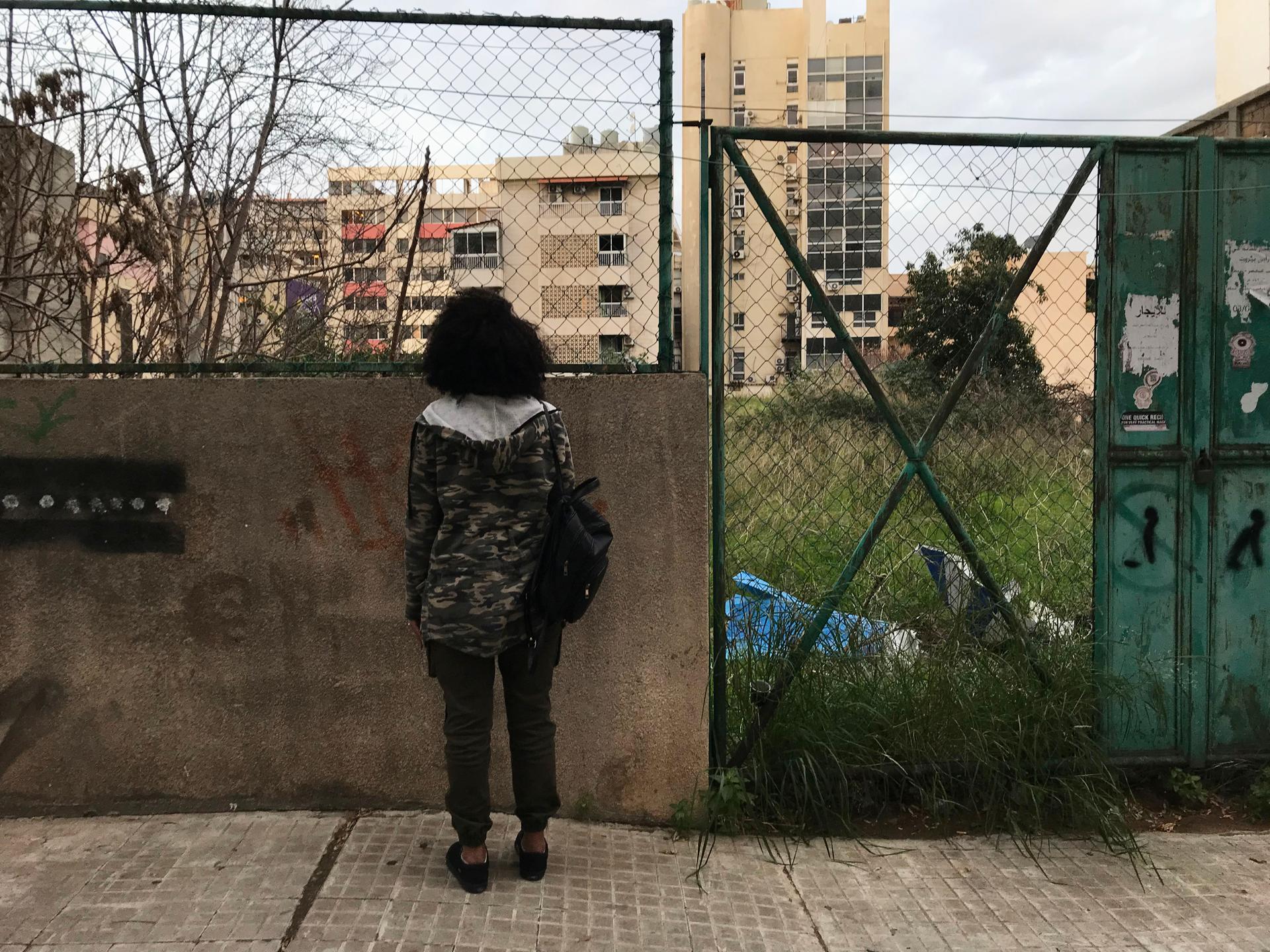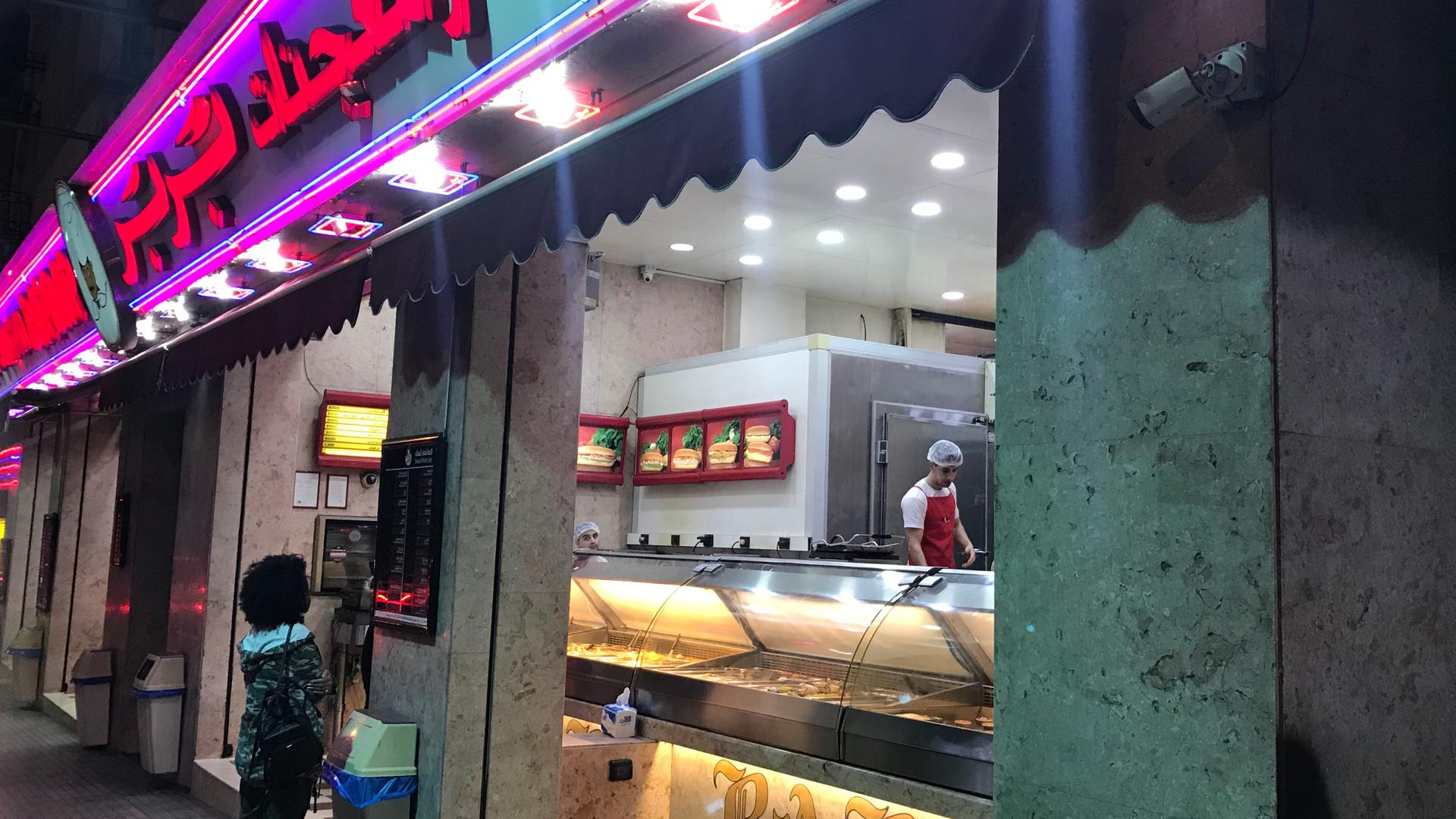As Lebanon’s economy spirals, foreign domestic workers remain stranded
Tsigereda, a domestic worker from Ethiopia, stands in front of a street food counter next to the Migrant Community Center in the Hamra neighborhood of Beirut, Lebanon, where activists with the Anti-Racism Movement help provide resources and classes for migrant workers.
As Lebanon’s economy teeters on the brink of collapse, Tsigereda, a domestic worker from Ethiopia, considers herself lucky to be one of the few migrants she knows who are still being paid by their employers.
Strained by soaring debt, Lebanon is facing its worst financial crisis since its 15-year civil war ended in 1990. As banks shutter and businesses across the country cut employees’ hours or fold altogether, many employees have gone unpaid — which means many of the hundreds of thousands of migrant workers employed in Lebanese homes are going unpaid, too. Owed months or even years’ worth of wages, migrants are unable to afford plane tickets home. And because employers and migrant recruitment agencies often confiscate workers’ passports, many are literally trapped in Lebanon.
Related: How Lebanon’s ‘WhatsApp tax’ unleashed a flood of anger
Tsigereda, who asked The World to withhold her last name for fear of reprisal, does not keep the money she earns for very long or send it home to her family in Ethiopia, where she left six years ago at age 18. Instead, she spends it on her fellow domestic workers in Lebanon.
“How can I say no, knowing what would happen?. … Now there is no money in Lebanon, girls want to go home. But without money, they cannot get home. And if nobody helps them, then they will have to go back to their employer and work for nothing. Maybe they will be abused — beaten or raped.”
“How can I say no, knowing what would happen?” Tsigereda said. “Now there is no money in Lebanon. Girls want to go home. But without money, they cannot get home. And if nobody helps them, then they will have to go back to their employer and work for nothing. Maybe they will be abused — beaten or raped.”

With nowhere else to go, many have remained with their employers and continue to work without a salary. Others who have run away are living on the streets in a country where they know few people and may not speak Arabic, Lebanon’s primary language.
Lebanon’s economic crisis has exacerbated existing hardships for workers under its kafala sponsorship system, which ties workers’ legal statuses to their employers with little oversight or accountability, making it difficult for migrants to report abuse or end their contracts. An estimated 250,000 such workers reside in Lebanon and are mostly women employed as live-in domestic help, according to a 2016 report by Human Rights Watch (HRW). The majority are from Ethiopia, as well as Sudan, Bangladesh, Nepal, Sri Lanka and the Philippines, according to the HRW report. Lebanese activists and many abused workers’ families, along with international watchdog groups like HRW and Amnesty International, have long called for the abolition of the kafala system, which they accuse of enabling “modern-day slavery.”
Related: How ads for ‘maids’ trap women in modern-day slavery in Jordan

Two domestic workers die in Lebanon every week, often by suicide or in botched escape attempts, according to a 2017 investigation by The New Humanitarian. Video clips of workers falling or jumping from apartment balconies periodically circulate online.
Some countries have banned their citizens from traveling to Lebanon for work. The Ethiopian government placed a ban on travel to Lebanon in 2013 and only lifted it in 2018 after attempting to draft better legislation to protect its citizens. But advocates say these restrictions have proven ineffective at curbing abuse, and that a better way to help workers abroad would be increasing consular assistance.
With Lebanon’s economic crisis, migrants who were vulnerable under the kafala system face even more challenges. The value of the Lebanese lira has plummeted, and banks have restricted depositors’ withdrawals amid a severe shortage of US dollars, which are also used in the country. Workers who still receive any sort of income often get it in lira instead of dollars.
Related: Lebanon: The lynchpin in Syria’s conflict
To send money home, many foreign domestic workers exchange their money at exchange bureaus to convert their lira into dollars, where they lose 30% or more of their wages to a rate priced higher than the official peg, according to several migrant workers who spoke to The World.
Banchi Yimer, a former domestic worker from Ethiopia and the founder of the Lebanon-based Ethiopian collective Engna Legna (“We to Us” in Amharic), said the number of women who message her for help has almost tripled in recent months from about four or five cases a day to as many as 15.
Other migrant advocates described encountering similar experiences, including HRW researcher Aya Majzoub and Alli Finn from the Lebanese activist group The Anti-Racism Movement, which runs affiliated Migrant Community Centers across Beirut, to provide classes, space and resources to migrants.
Divine, 38, who has worked in Lebanon for 15 years, is now owed four months’ salary and wants to return home to her family in the Philippines.
“Time is precious,” Divine told The World. Her job in Lebanon allowed her to help support her parents and siblings, but it also prevented her from finding a partner or building a life back home, she said. “All the sacrifices I have made and patience — I deserve my money.”
Unlike most migrants who have been denied their wages, Divine is able to leave Lebanon. In December, the Philippines Embassy in Lebanon offered free repatriation to more than 1,000 nationals, citing Lebanon’s current financial and economic woes.
However, many other workers remain trapped. Earlier this month, hundreds of Bangladeshis crowded outside their embassy in Beirut seeking expedited exit visas, overwhelming embassy staff. In late January, Lebanese police cleared a makeshift camp set up by Ethiopian and Sudanese migrants outside the Beirut offices of the United Nations High Commissioner for Refugees (UNHCR).
“I have nowhere to go,” said Niya, an Ethiopian domestic worker who was among those ejected from the camp and who also asked The World to protect her identity by withholding her last name. “I cannot do anything now other than pray.”
In the past two months, Engna Legna has paid for eight women to return to Ethiopia after they ran away from employers who were withholding their wages, and in several cases subjecting them to abuse. The collective’s funds are donated by its members – Ethiopian domestic workers who, like Tsigerda and Yimer, know what it is like to feel trapped.
“Everytime you see a girl who has run away, there is a story there. … They are running away from physical and sexual abuse, from not being paid, from not enough food and unhealthy living conditions and not being allowed to speak to their families on the phone or to leave the house. It’s why I ran away.”
“Every time you see a girl who has run away, there is a story there,” Yimer said. “They are running away from physical and sexual abuse, from not being paid, from not enough food and unhealthy living conditions and not being allowed to speak to their families on the phone or to leave the house. It’s why I ran away.”
To maintain control over workers, employers and predatory recruitment agencies often confiscate workers’ passports and documentation upon their arrival in Lebanon. A recent message posted in a Facebook group where Lebanese mothers usually swap shopping and grocery tips reads: “Does anyone have an Ethiopian girl they no longer want or can’t pay that I can take?”
“People think you don’t matter; they think you are just some Ethiopian girl,” Tsigereda said. “There is nobody there to force them to do the right thing, to make them pay when they [are] supposed to pay, or arrest them.”

Migrant workers’ plight comes at a significant moment in Lebanon’s history. The economic crisis has prompted mass anti-government demonstrations since October. Hundreds of thousands of protesters have taken to the streets, demanding that politicians be held accountable for their corruption and mismanagement.
“Migrant workers provide essential services that the Lebanese state should offer — childcare, basic support for elderly people. … It is all part of the same dysfunctional, exploitative system, a system that does not serve the interests of the people living within it.”
“Migrant workers provide essential services that the Lebanese state should offer — childcare, basic support for elderly people,” said Finn with The Anti-Racism Movement. “It is all part of the same dysfunctional, exploitative system, a system that does not serve the interests of the people living within it.”
Sometimes, when she is tired after a long day, Tsigereda likes to lie in bed and listen to reggae music on her phone or watch the courtroom drama, “How to Get Away with Murder,” which features a glamorous, big-shot lawyer from humble origins, played by Viola Davis. She wishes domestic workers in Lebanon had someone like Davis’ character to help them fight back against injustice.
“We know nothing will happen if we don’t do it ourselves,” Yimer said. “We have to support and empower each other, because nobody else will.”
Although Yimer no longer resides in Lebanon, she has continued her advocacy, lobbying the Ethiopian Embassy, messaging with abused workers and making travel arrangements on their behalf, while Tsigereda coordinates Engna Legna’s monthly meetings in Lebanon at the Migrant Community Center.
Tsigereda hopes to soon return home to Ethiopia, where she aspires to pursue her childhood dream of becoming a journalist.
“I’m not making any money working in Lebanon — none of us are,” Tsigereda said. “I want to start living my own life.”
Correction: This story misstated Tsigereda’s age when she left Ethiopia and incorrectly said she had been unpaid for two years of work.
